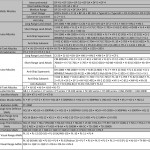American spying challenges comprise three categories, namely, friends, enemies and problems. The top two challenges are Brazil and Egypt. That India is No.3 challenge to U.S intelligence1 is strange, considering that India’s PM Dr.Manmohan Singh is known to be submissive to U.S policies and pressures.
From principled non-alignment of Nehruvian days, India became a client state of USA. This was amply demonstrated seven years later in June 2013, with India actually making excuses for NSA spying on India exposed by Edward Snowden.
Perhaps this submissiveness began with the July 2005 India-USA strategic framework signed in Washington, between U.S president George W. Bush and Dr.Manmohan Singh. The main pillars of strategic cooperation were (1) civilian nuclear cooperation to revive the moribund American nuclear industry and, as claimed by the UPA-1 government, ensure India’s energy security, and (2) the knowledge initiative in agriculture to give better access to U.S GM giant Monsanto into Indian agriculture and, as claimed by the UPA-1 government, ensure India’s food security.
The 123 Agreement is a general nuclear agreement USA has with other countries. But with India, it was overshadowed by the India-specific “Henry J. Hyde United States-India Peaceful Atomic Energy Cooperation Act of 2006“, that visualizes India having a foreign policy congruent with that of USA, and actively participating in USA’s efforts to implement sanctions against Iran for not conforming to USA’s checks on acquisition of n-weapons.2 [Note 1].
Dr.Manmohan Singh staked his UPA-1 government for the 123 nuclear deal by making a political quid pro quo alliance with the Samajwadi Party for survival, after the Left withdrew support. It is less well known that at the same time he also staked India’s sovereignty, by implicitly aligning India’s foreign policy with the USA. From principled non-alignment of Nehruvian days, India became a client state of USA. This was amply demonstrated seven years later in June 2013, with India actually making excuses for NSA spying on India exposed by Edward Snowden. It appears that India has been “promoted” from Target No.5 after Iran, Pakistan, Jordan and Egypt3 to Target No.3, neither friend nor foe, but a “problem”, even while being a submissive junior strategic partner of the world’s foremost warmonger. Thus, NSA, with presidential sanction, could well be monitoring the content of telephone calls, emails and cell phone messages of India’s PM, as happening with Brazil’s president.1.
Spying-snooping-scrutiny
Edward Snowden’s expose caused international outrage for NSA infringing on individual privacy, and on friends and foes alike at governmental and public levels. USA’s NATO allies were vocal in their feigned outrage at the revelation that their cyberspace had been secretly invaded by NSA, even their embassies bugged, and data mining performed on their official and private citizens’ communications. True to this writer’s prediction that “there is unlikely to be even a squeak on this sovereignty issue”3, India, far from even feigning outrage, has sought to play down USA’s presidentially-sanctioned spying, snooping and surveillance by terming it as “scrutiny” of India’s cyberspace. However, even “scrutiny”, the mildest of the terms [Note 2], is objectionable because it impinges on India’s sovereignty.
USA’s enormous technological capacity to not merely intercept, copy and store data mined without the knowledge of the rightful owner of the data, but also to match and analyse it on desired parametric bases, makes the words spying, snooping and surveillance, all applicable.
NSA has been mining all electronic data including official and personal correspondence and information at state and national level. USA’s enormous technological capacity to not merely intercept, copy and store data mined without the knowledge of the rightful owner of the data, but also to match and analyse it on desired parametric bases, makes the words spying, snooping and surveillance, all applicable. NSA’s “scrutiny” of India’s cyberspace would inevitably include the personal correspondence and political and financial affairs of members of state and central governments, legislatures and judiciary, besides ordinary citizens. Subsequent close and thorough examination of this data and sorting it by name and political party, etc., would allow profiling any and every bureaucrat, legislator and judge, who would then be open to manipulation and influence from USA.
It is not at all clear whether Mr.Salman Khurshid and other apologists for USA’s arrogant spying-snooping are aware of the personal and official risks of “mere scrutiny”. If they are, it may indicate that they are already compromised. However, it is inconceivable that the general approach if not the precise terms of Mr.Salman Khurshid’s supine equivocation was possible without the directions or approval of Dr.Manmohan Singh, an icon of submissiveness to American “superiority”.
There are people who opine that since India cannot do anything technically or politically about USA’s data mining in India, we should acquiesce. That is in line with the tame and unprincipled policy adopted by external affairs minister Salman Khurshid, in contempt of India’s Constitution that defines India as a sovereign Republic.
Without trace of embarrassment or apology, USA is brazenly maintaining that it has been secretly mining data and physically bugging foreign embassies and premises, all blatant acts of spying-snooping, in order to protect itself against terrorist threat by comprehensive surveillance over U.S and non-U.S citizens, associations and groups. It is now revealed that it has also been spying-snooping over the past many years to gain political, economic, trade and commercial advantage over its own allies and strategic partners, in addition to its ideological and military adversaries. USA’s hegemonic Project for a New American Century (PNAC) – or the new American Empire – is heavily based upon intelligence gathering by passive and offensive cyber operations, assisted by its four servile spying-snooping partners, Britain, Australia, Canada and New Zealand, all remnants of the erstwhile brutal and rapacious British Empire.
With growing public anger that India’s cyber vulnerability was secretly exploited by U.S spying-snooping, India hurriedly issued its policy on cyber security.
Surveillance and security
Surveillance by USA on India’s leaders and private citizens is bad enough, but India is preparing for its own internal surveillance. Surveillance assumes that the subject surveilled is a suspected spy or a criminal [Note 2]. This assumption for general public surveillance in a democracy is unwarranted because the general public becomes “suspect”. Surveillance of criminal suspects (targetted surveillance) is standard police and intelligence practice and, in a democratic society, is done with appropriate established, well-defined checks and safeguards, so that the power of surveillance is not misused to gain advantage or blackmail or settle scores for political or partisan purposes. Even with checks and balances in place, targetted surveillance has led to innumerable cases of staged or false “encounters” resulting in extra-judicial killings based on questionable intelligence reports, mere suspicion or motivated political orders.
The general public surveillance envisaged by India’s Centralized Monitoring System (CMS) is unwarranted, because it is blanket sanction to monitor any or all activities of any or all citizens, associations and groups, and permits secret profiling on the basis of any parameter or combination of parameters such as religion, language, association, ethnicity, etc. Public surveillance thus assumes that any or every citizen is a suspected criminal who can be profiled or picked up at the discretion of an anonymous surveillor.
In this dispensation, instead of the citizen critically watching the State for performance, the shadowy, anonymous surveillors of the State watch the citizen for criminality, thus inverting the constitutional supremacy of the We the People over the State. It marks the beginnings of a police state with unaccountable power to persons in control, not unlike Hitler’s Nazi Germany, Mussolini’s Italy or the former Soviet Union or the People’s Republic of China, all notable for peremptory, brutal and vicious State power.
It is not at all clear whether these grave implications of implementing CMS are in the knowledge of India’s USA-philic legislators, judiciary or middle class intelligentsia. However, it is a good guess that India’s corporate captains who wield enormous influence of money and opinion in the corridors of state and central power are not merely aware, but are actively encouraging CMS and appurtenant organizations like UIDAI and NATGRID.





